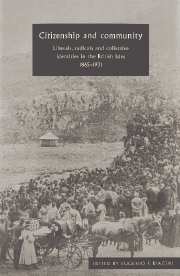 Citizenship and Community
Citizenship and Community Book contents
- Frontmatter
- Contents
- List of contributors
- Acknowledgements
- Introduction: Citizenship, liberty and community
- Part I Citizenship, populism and liberalism
- Part II Economic democracy and the ‘moral economy’ of free trade
- 6 The National Agricultural Labourers' Union and the demand for a stake in the soil, 1872–1896
- 7 Free trade, protectionism and the ‘food of the people’: the Liberal opposition to the Cattle Diseases Bill of 1878
- 8 Towards the ‘hungry forties’: free trade in Britain, c. 1880–1906
- 9 The strange death of free trade: the erosion of ‘liberal consensus’ in Great Britain, c. 1903–1932
- Part III Democracy, organicism and the challenge of nationalism
- Part IV Consciousness and society: the ‘peculiarities of the British’?
- Index
9 - The strange death of free trade: the erosion of ‘liberal consensus’ in Great Britain, c. 1903–1932
Published online by Cambridge University Press: 16 September 2009
- Frontmatter
- Contents
- List of contributors
- Acknowledgements
- Introduction: Citizenship, liberty and community
- Part I Citizenship, populism and liberalism
- Part II Economic democracy and the ‘moral economy’ of free trade
- 6 The National Agricultural Labourers' Union and the demand for a stake in the soil, 1872–1896
- 7 Free trade, protectionism and the ‘food of the people’: the Liberal opposition to the Cattle Diseases Bill of 1878
- 8 Towards the ‘hungry forties’: free trade in Britain, c. 1880–1906
- 9 The strange death of free trade: the erosion of ‘liberal consensus’ in Great Britain, c. 1903–1932
- Part III Democracy, organicism and the challenge of nationalism
- Part IV Consciousness and society: the ‘peculiarities of the British’?
- Index
Summary
To a Victorian observer contemporary politics would have looked strangely familiar. The political landscape is haunted by the sudden reappearance of mid-Victorian ghosts: a united Germany, angry French peasants and free trade. The British government has not missed the golden opportunity created by the revival of nationalism to appoint itself once more the ‘true’ guardian of internationalism. Naturally, this is legitimised by reference to Britain's historical record; typically, it is supported by references to the alleged lessons of the past. Just as Edwardian free traders were fond of citing the ‘hungry forties’, the present Foreign Secretary has chosen the misery of the ‘thirties’ as an example of the ‘ruinous effects of “beggar-my-neighbour” protection’.
Yet here the similarities end. The excitement generated by fiscal controversies has been marginal since Britain abandoned free trade in 1931. To question the virtues of free trade does not ruin governments, split parties or dominate general elections. Nor did GATT aim at universal free trade: it aimed at freer international trade. No political party in the west any longer holds the pure vision of economic liberalism. Cobdenites would feel little sympathy with the accepted level of subsidies, regulation, or ‘hidden’ protectionism. This loss of purity has been accompanied by a fundamental realignment of the political forces of liberal internationalism. Not only has the traditional champion of protectionism, the Conservative Party, become the stronghold of liberal economics, the recent debate about GATT has also exposed just how much free trade today is greeted with cynicism in its traditional radical home.
- Type
- Chapter
- Information
- Citizenship and CommunityLiberals, Radicals and Collective Identities in the British Isles, 1865–1931, pp. 219 - 250Publisher: Cambridge University PressPrint publication year: 1996
- 7
- Cited by


